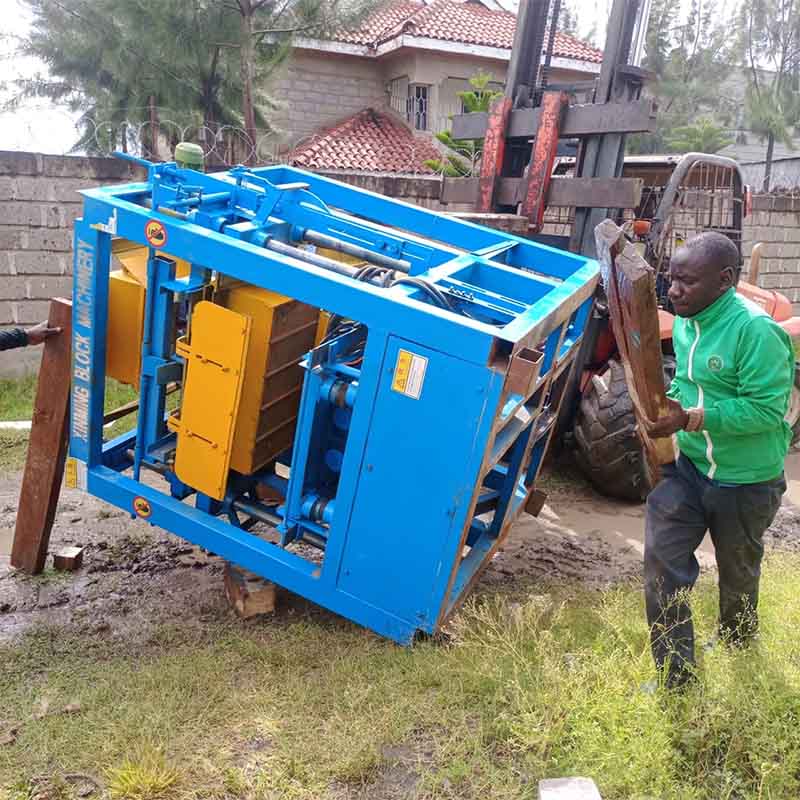
Image source Aiweibrickmachine
Title: Training Programs for Operators of Full-Automatic Block Machines
Introduction
The successful operation of full-automatic block machines requires skilled operators who are well-versed in the intricacies of the machinery, automation systems, and quality control processes. Training programs play a crucial role in equipping operators with the necessary knowledge and skills to maximize the efficiency and productivity of these advanced manufacturing systems. In this article, we will explore key components and strategies for designing effective training programs for operators of full-automatic block machines.
### 1. **Comprehensive Machine Familiarization:**
– **Overview of Machine Components:**
Begin the training program with an in-depth introduction to the various components of the full-automatic block machine. This includes understanding the functions of the mixing system, molding unit, compaction mechanism, curing system, and any additional features.
– **Control Systems Understanding:**
Provide detailed training on the machine’s control systems, including human-machine interfaces (HMIs) and any integrated software. Operators should be familiar with navigating the control panel, setting parameters, and troubleshooting common issues.
### 2. **Operational Procedures and Safety Protocols:**
– **Start-up and Shut-down Procedures:**
Train operators on the correct start-up and shut-down procedures for the full-automatic block machine. This includes pre-operation checks, system initialization, and proper shutdown protocols to ensure safety and equipment longevity.
– **Safety Guidelines:**
Emphasize safety protocols and best practices during machine operation. This should cover personal protective equipment (PPE), emergency procedures, and safe handling of materials and tools.
### 3. **Quality Control and Assurance:**
– **Understanding Quality Standards:**
Educate operators on the quality standards and specifications that the blocks must meet. This includes dimensional accuracy, compressive strength, and other relevant criteria.
– **Real-time Quality Monitoring:**
Introduce operators to the quality monitoring systems integrated into the machine. This may include automated vision systems, sensors, and other technologies used for real-time quality control during production.
### 4. **Maintenance Procedures:**
– **Preventive Maintenance Training:**
Provide training on preventive maintenance procedures to ensure the optimal performance and longevity of the full-automatic block machine. This includes regular checks, lubrication schedules, and replacement of wear parts.
– **Troubleshooting Skills:**
Equip operators with troubleshooting skills to identify and address common issues that may arise during operation. This includes diagnosing mechanical problems, resolving electrical issues, and understanding error messages.
### 5. **Efficiency Optimization Techniques:**
– **Parameter Optimization:**
Train operators to optimize machine parameters based on production requirements. This includes adjusting settings for different block types, sizes, and desired characteristics.
– **Material Handling Optimization:**
Provide insights into optimizing material handling processes to minimize waste, enhance efficiency, and ensure consistent block quality. This includes understanding the characteristics of raw materials and adapting handling procedures accordingly.
### 6. **Real-world Simulation and Practical Exercises:**
– **Simulation Software:**
Use simulation software to create virtual environments that replicate the operation of the full-automatic block machine. This allows operators to practice different scenarios, test their skills, and gain confidence in handling the equipment.
– **Hands-on Training:**
Incorporate hands-on training sessions using a training version of the full-automatic block machine or a similar simulation. This provides practical experience in a controlled environment before operators engage with the actual production machine.
### 7. **Continuous Learning and Updates:**
– **Regular Training Updates:**
Given the evolving nature of technology, schedule regular training updates to keep operators informed about new features, software updates, and advancements in full-automatic block machine design.
– **Knowledge Sharing Sessions:**
Facilitate knowledge-sharing sessions where experienced operators share best practices, tips, and lessons learned. This encourages a collaborative learning environment and fosters a sense of community among operators.
### 8. **Assessment and Certification:**
– **Performance Assessments:**
Implement regular assessments to evaluate operators’ understanding and application of the training material. This may include written tests, practical demonstrations, and problem-solving exercises.
– **Certification Programs:**
Establish a certification program to recognize operators who successfully complete the training. Certification adds credibility to an operator’s skill set and provides a clear benchmark for proficiency.
### Conclusion:
Effective training programs for operators of full-automatic block machines are essential for achieving optimal performance, ensuring safety, and meeting quality standards. By incorporating comprehensive machine familiarization, safety protocols, quality control principles, and hands-on practical exercises, manufacturers can empower operators with the skills needed to navigate the complexities of advanced block production machinery. Continuous learning initiatives and a commitment to ongoing training updates will further contribute to the success of operators and the overall efficiency of full-automatic block manufacturing processes.
